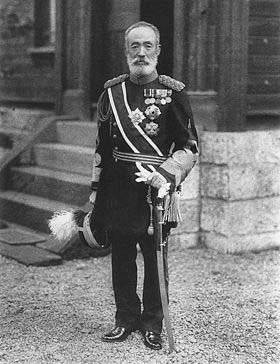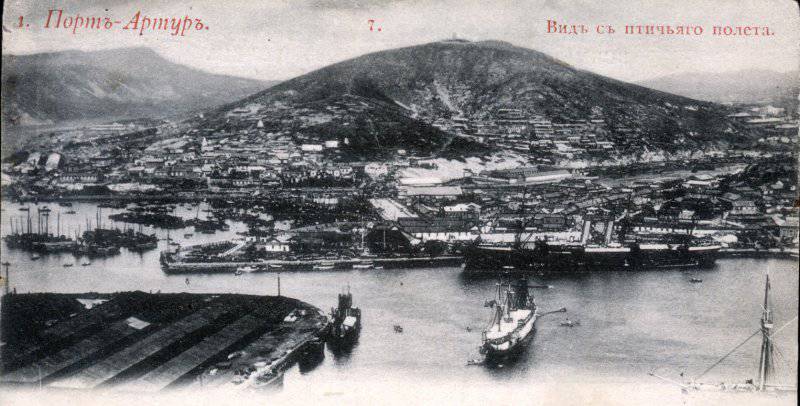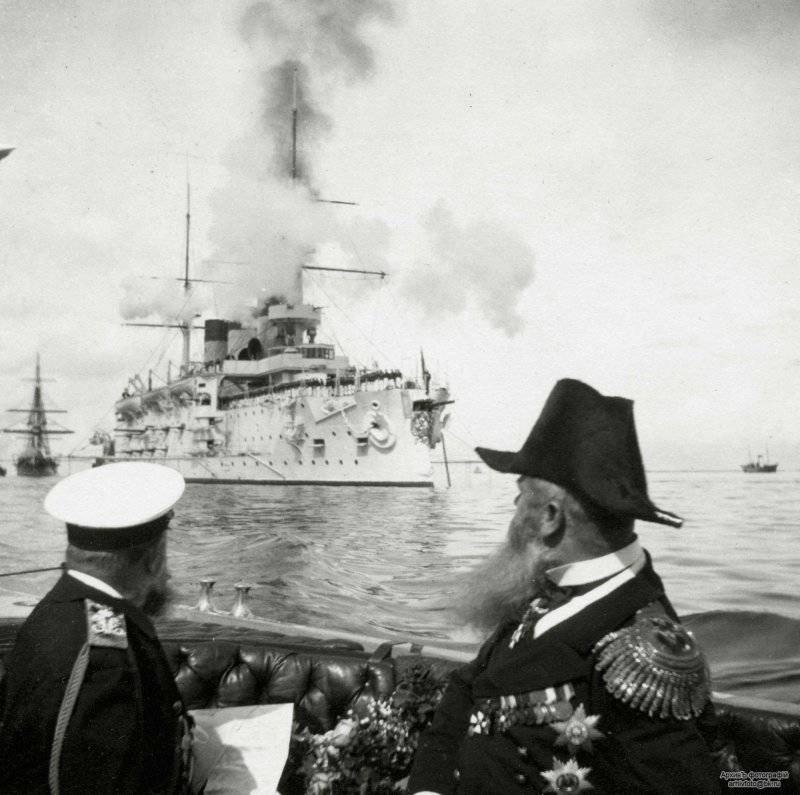Is Port Arthur a Victory or a Defeat?
Successes in the development of the Far East made it necessary to have a military contingent in this part of the country; by 1885, its number here was no more than 18 thousand. In order to make the region accessible for the rapid transfer of reinforcements, the imperial authorities began active construction of a railway bed in the region. Already in 1891, the construction of the famous Trans-Siberian Railway was launched. Vladivostok was founded as early as 1860, and since 1899, a program has been launched to create a military naval base in Port Arthur. The empire was primarily interested in the development of trade in the region, which was planned to be carried out through non-freezing ports. Russia's presence in the territories claimed by Japan caused sharp contradictions in foreign relations with the latter.
In general, Japanese policy since the Meiji Restoration has been quite aggressive. She established control over Korea, and also occupied the territory of China. The economic and technological breakthrough, sponsored mostly by the forces of Great Britain and the United States, made it a rather powerful military power. Interestingly, in 1902, an allied agreement was signed between the British government and the Japanese authorities, which obliged Britain to provide military support in the event of war with Japan with two or more states at the same time. The existence of this treaty leads to reflections on the role of Montenegro, which declared war on Japan since the start of hostilities in the Far East. It should be noted that this country did not render substantial assistance to Russia in opposition, in contrast to Great Britain, which actively supplied the Japanese armies with the latest weapons. Referring to this circumstance, modern researchers conclude that the decision to declare war on the part of Montenegro was made with the active assistance of England. Speaking openly, the Russian Empire was at war with a coalition that, in addition to Japan, also included Great Britain and the United States. Both countries can solve their political tasks with the blood of soldiers from third countries.
In Soviet textbooks, the Russo-Japanese war is presented as a shameful defeat of rotten imperialism. However, very dubious facts and evidence are cited as evidence of the defeat, and under certain circumstances the so-called crushing defeat of Russia does not agree at all. Especially many questions are caused by the surrender of the Port Arthur military naval base by General Anatoly Mikhailovich Stessel, who was subsequently declared a coward and a traitor. It should be noted that Soviet historians had a biased attitude toward everything that concerned tsarism and its actions.
At the end of July, the Japanese armies were on the outskirts of the sea fortress, in which there were about 50-ti thousand people of military men and sailors. At the head of the defense was General Stoessel, who was ordered to leave the fortress from Kuropatkin. However, Stoessel requested permission to remain and defend Port Arthur. And here is the first circumstance inexplicable by the official theory: a coward and a traitor himself volunteered to defend the fortress from the army, which was significantly superior in numbers to the forces he commanded. Subsequently, in court, a loud accusation against Anatoly Mikhailovich will fall apart and only three formulations will remain of him. He will be accused of inaction regarding the activities of the Lieutenant-General by the name of Fock, a minor breach of duty and surrender of the fortress without sufficient reason. Moreover, the verdict does not mention the cowardice and betrayal, moreover, the court asks the court for his pardon for the convict. Against the background of Kuropatkin's order to surrender the fortress without a fight, as well as other evidence of the complete exhaustion of the forces of the defenders, the sentence looks, to put it mildly, absurd and unfair.
 Particularly incomprehensible on the background of loud statements about the disgraceful surrender of Port Arthur looks like the rite of seppuku Legs Maresuke. The army commander of the winners, assessing the results of the siege of the fortress, immediately wanted to make himself a hara-kiri, as evidenced by numerous sources. Naturally, there is a desire to ask the accusers of the “rotten tsarism” about the grounds for such an intention. And even after the ban on the rite against the Females from the royal monarch, the gallant victory, as she is called, nevertheless became a pretext for the suicide of the Feet after the death of the emperor. The answer is very simple: the capture of Port Arthur is not a victory at all. It is rather the defeat of the Japanese army under the incompetent command of Marasuke.
Particularly incomprehensible on the background of loud statements about the disgraceful surrender of Port Arthur looks like the rite of seppuku Legs Maresuke. The army commander of the winners, assessing the results of the siege of the fortress, immediately wanted to make himself a hara-kiri, as evidenced by numerous sources. Naturally, there is a desire to ask the accusers of the “rotten tsarism” about the grounds for such an intention. And even after the ban on the rite against the Females from the royal monarch, the gallant victory, as she is called, nevertheless became a pretext for the suicide of the Feet after the death of the emperor. The answer is very simple: the capture of Port Arthur is not a victory at all. It is rather the defeat of the Japanese army under the incompetent command of Marasuke.Feet calculation was on instant grab the fortress in the first assault. However, it was not possible to break the resistance of the Russian soldiers. Throughout the day, the Japanese fired at Port-Arthur on the front lines and only at the end of the day decided to attack. As a result of the bloody battle, the Russians abandoned the advanced fortifications and took refuge in the fortress itself. Despite the fact that the Japanese have achieved some success and occupied the redoubts Xiaogushan and Dagushan, luck cannot be called the outcome of the first day. The losses were too significant and according to the Japanese side, which raise serious doubts about the reliability, were about 1200-1300 people.
On the very first day, Maresuuke should have thought about the advisability of further attempts to take Port Arthur. The number of the Japanese army was melting before our eyes, the mobilization potential and economic power could suffice only for a year of such battles. At the time of the storming of the fortress, reinforcement was required by other parts of the Japanese army in more important positions. However, Legs stubbornly stood his ground and attempted a first assault, as a result of which the Japanese suffered enormous losses. Almost half of the army of the besiegers was destroyed. The siege took a protracted nature, which was Marasuke’s unforgivable mistake. Instead of refusing further attempts, detrimental to the Japanese themselves, the commander demanded reinforcement and sent the remaining soldiers to certain death. An attempt by the Japanese commander to repeat the events of the war of Prussia and France connected with the capture of Sedan failed miserably.
The second assault, repeated a month later, took about 6-ti thousand Japanese and did not give significant results. The fortress heroically kept. The third assault was undertaken on September 18, but again did not bring a long-awaited victory. It must be said that the Russians lost far fewer soldiers than the Japanese, but were under siege conditions. Food was almost over, there was not enough medicine and ammunition, people died under enemy fire, in battle, as well as from the spread of scurvy. New losses did not stop Legs, and the siege continued. At this time, battles were fought at Shahe, where the Marasuke army could provide great support. The fourth assault lasted from 13 to November 22, but in the end the Japanese only managed to occupy the strategically important High Mountain. This, in fact, was the key to Port Arthur, since here the attackers could coordinate the strikes of their artillery.
However, the surrender of the fortress occurred only on December 20 after Stossel held the military council. If you refer to the protocol, you can understand how difficult the position of the besieged was. From forty thousand combat-ready soldiers, according to various estimates of the officers, there remained from 10 to 12 –t thousands of half-starved and exhausted fighters. Where did the figure of thousands of prisoners in 23 come from in the reports of the Japanese and the materials of the court? It's simple. First, in addition to the 10 of thousands of soldiers and officers, there were at least 10 of thousands of wounded and sick in the fortress, who surrendered along with their brothers arms. Secondly, the data of the Japanese are very unreliable, since their reports too often “sin” by understating victims on their part and overestimation for the enemy. Falsification was present in the war with the Chinese.
Is it possible to call the surrender of Port Arthur through 329 days of siege and fierce fighting as a defeat of the Russian forces and betrayal by Stoessel? The answer is simple - no! The general made the only right decision, since he was well aware that the fifth assault would be the last for the fortress, and the Japanese, who had so long achieved victory, were merciless. The man, subsequently branded as a traitor and a coward, was able to take responsibility for the surrender of Port Arthur for the sake of preserving the lives of his soldiers, each of whom is worthy to carry the title of hero.
The Russian-Japanese war, a historically important moment, which was presented to us as a shameful defeat of tsarism, turns out to be completely different and deserves attention and discussion in society. This is another attempt to discredit Russia in the eyes of its descendants, which must be stopped.


Information